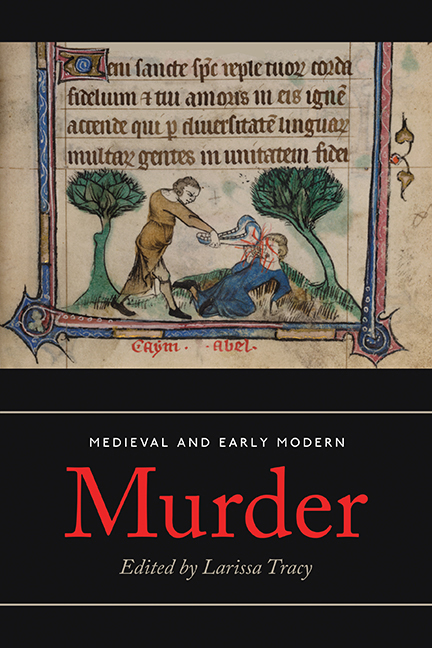Book contents
- Frontmatter
- Contents
- List of Illustrations and Tables
- Acknowledgements
- Contributors
- List of Abbreviations
- Introduction: Murder Most Foul
- I Murder on Trial: Justice, Law and Society
- II The Public Hermeneutics of Murder: Interpretation and Context
- III Murder in the Community: Gender, Youth And Family
- 13 Negotiating Murder in the Historiae of Gregory of Tours
- 14 Poisoning, Killing and Murder in the Edictus Rothari
- 15 Murder, Foul and Fair, in Shota Rustaveli's The Man in the Panther Skin
- 16 A Multiple Poisoning in the City of Valencia: Sanxo Calbó's Crime (1442)
- 17 A Case of Mariticide in Late Medieval France
- 18 Monstrous Un-Making: Maternal Infanticide and Female Agency in Early Modern England
- 19 Imps of Hell: Young People, Murder and the Early English Press
- Conclusion
- Select Bibliography
- Index
13 - Negotiating Murder in the Historiae of Gregory of Tours
from III - Murder in the Community: Gender, Youth And Family
Published online by Cambridge University Press: 05 July 2018
- Frontmatter
- Contents
- List of Illustrations and Tables
- Acknowledgements
- Contributors
- List of Abbreviations
- Introduction: Murder Most Foul
- I Murder on Trial: Justice, Law and Society
- II The Public Hermeneutics of Murder: Interpretation and Context
- III Murder in the Community: Gender, Youth And Family
- 13 Negotiating Murder in the Historiae of Gregory of Tours
- 14 Poisoning, Killing and Murder in the Edictus Rothari
- 15 Murder, Foul and Fair, in Shota Rustaveli's The Man in the Panther Skin
- 16 A Multiple Poisoning in the City of Valencia: Sanxo Calbó's Crime (1442)
- 17 A Case of Mariticide in Late Medieval France
- 18 Monstrous Un-Making: Maternal Infanticide and Female Agency in Early Modern England
- 19 Imps of Hell: Young People, Murder and the Early English Press
- Conclusion
- Select Bibliography
- Index
Summary
IN HIS HISTORIAE, the sixth-century bishop Gregory of Tours (c. 538–94) narrates a brutal killing carried out by Childebert and Chlothar, sons of the famous Merovingian Frankish king Clovis (Hist. III.18). Childebert, who was king of Paris (r. 511–558), plotted to seize the kingdom of Orleans from his nephews, heirs of his recently deceased brother Chlodomer. Gregory writes that Childebert was driven by invidia [envy] of his nephews, who had become the favourites of Childebert's own mother, Clovis’ widow Chlothild (III.18). To carry out his scheme, Childebert turned to another brother, Chlothar, king of Soissons (r. 511–561), and together they devised a ruse to separate the princes from Chlothild. Their nephews, as Gregory repeatedly emphasises, were very young, only seven and ten years of age. After succeeding in isolating the boys, Childebert and Chlothar coldly enacted their plan: Chlothar threw the older child to the ground, stabbed him in his armpit and ‘crudeliter interfecit’ [savagely killed] him (III.18). Upon witnessing the horror of the crime, and with the younger boy's desperate pleas for mercy ringing in his ears, Childebert had a change of heart and begged Chlothar to stop. In response, Chlothar threatened to kill Childebert as well; Chlothar then seized the screaming younger boy and killed him too. To eliminate witnesses, Chlothar and Childebert then slaughtered all the boys’ attendants and, Gregory says, left without any compunction for what they had done (III.18).
Violent vignettes such as this one have contributed to the particularly bloody reputation of the Historiae and have long captivated historians. But while many studies have explored aspects of this violence, a deeper analysis of some of Gregory's bloodiest narratives provides details about his definitions of illegitimate killing and their purpose in his text. The example of Chlothar and Childebert is particularly illustrative: Gregory employs several strategies to demonstrate injustice, including direct statements of impropriety, either in his own voice or that of an interlocutor, the provision of narrative detail highlighting motives and consequences, the use of special terms to emphasise the inhumanity of the act and even the location and context within his books. Gregory affirms that Childebert and Chlothar's killings were committed crudeliter [savagely] and poignantly depicts Clothild's grief afterward.
- Type
- Chapter
- Information
- Medieval and Early Modern MurderLegal, Literary and Historical Contexts, pp. 311 - 332Publisher: Boydell & BrewerPrint publication year: 2018

